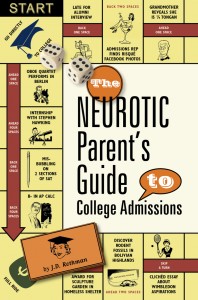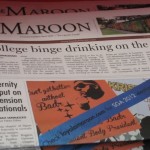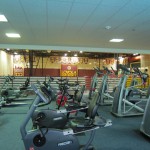CLICK HERE to sign up for our Newsletter!
call us 713-405-1193
call us 713-405-1193
Blog
A Q&A With The Neurotic Parent
May 30, 2012
by All-in-One Academics
0 Comment
 One of our favorite college admission industry blogs is The Neurotic Parent (http://neuroticparent.typepad.com/), and what we like best about it is the seemingly accidental nature of its existence. Ms. Rothman started her personal chronicle of the college admissions process as she helped her children navigate the gauntlet and recognized the increasing absurdity of its rigors.
One of our favorite college admission industry blogs is The Neurotic Parent (http://neuroticparent.typepad.com/), and what we like best about it is the seemingly accidental nature of its existence. Ms. Rothman started her personal chronicle of the college admissions process as she helped her children navigate the gauntlet and recognized the increasing absurdity of its rigors.
Ms. Rothman is sort of a personal heroine for me because she has had the courage to call a spade a spade, while so many other rational people seem to have drunk the college admissions Kool-Aid. And, as it turns out, people have craved her wit and sarcasm to lighten the mood of such a serious topic – so much so that her book, The Neurotic Parent’s Guide to College Admissions, has become an LA Times Best Seller!
Recently, we got in touch with Ms. Rothman to get a little insight about what motivated her to start the blog and what has happened since. Below is our Q&A!
You write an incredibly informative, but lighthearted blog about college admissions. What triggered the creation of your blog?
In 2008, a fellow soccer mom encouraged me to blog when she heard I had planned an eight-state, twelve-college, spring break college tour with my older son. She assumed I would write about our insane itinerary. But on the road I discovered even better blogworthy material: a stressed out breed of neurotic parents who bragged obnoxiously about their children during information sessions. Many had been prepping their kids for college since birth. In horror, I realized that my kids, who were good students but normal teens, would be competing with applicants who had discovered new galaxies or founded Tanzanian orphanages. The blog went viral and I continued it anonymously for three years because I was afraid that revealing my identity would affect my sons’ college chances. I did not even use my name when the dean of admissions of Kenyon published an excerpt in her book, even though she assured me that admissions people loved the blog and even recommended it to panicked parents. Finally, when I made a deal with publisher Colleen Bates of Prospect Park Media (who also was a neurotic parent), she convinced me to put my name on the book.
What is the real purpose of your work? Is it to help people maintain a rational perspective?
My “day job” is as a children’s television writer, so for me, the original appeal of the blog was to write in my own voice without getting notes from dozens of network and studio executives. But now that the book has become an LA Times bestseller, I realize that many parents are craving a little bit (okay, a lot) of levity to cope with the stress of the college admissions process. I have done signings and panels all over the country, and many cities that we assumed were non-neurotic are actually filled with angst-ridden moms, dads and teens. Parents contact me daily with “real” questions about which shoes their kids should wear to alumni interviews, how to get off waitlists or even whether their children should choose Tufts or Johns Hopkins. I always preface my answers that I am really a comedy writer with no real credentials, but I now realize I am one of the few parent “experts” out there…someone who has been through the process twice with my kids. And I do believe that laughter combined with real information does calm people down.
Do you ever see any backlash because people think you’re not serious enough?
Although my book is primarily a humor book, many readers have told me thanked me for the laughs and also for providing them with a lot of real information about the process. People want to laugh about the crazy state of affairs – kids with 12-page resumes, SAT tutors who earn more than top litigators, and Junior Kumon for 4-year olds. I spoke at one packed event in the library of the East Bay suburb of Pleasanton, CA, a hotbed of neurosis. People were taking notes, even during my faux SAT, because as someone who has been on umpteen college tours, I do impart information that is not always available from counselors. Even the panicked parents on the anxiety-ridden website, collegeconfidential.com, have posted that they love the book.
How have you seen attitudes towards college admissions change since youstarted this blog?
The year my older son applied (’08-9) was supposed to be the Most Difficult Year to Get Into College in the History of the World because it was the peak of the baby boomlet. But this year ended up even more competitive because students are now applying to 23 schools instead of 14. (This is partly because of the ease of applying to multiple schools using the Common App, partly because students want to compare financial aid packages and partly because of the randomness of admission changes.) NYU said they had received a record-breaking 29,000 applications for the class of 2013, while this year, for the class of 2016, there were 44,000.
Another trend is that many of the Ivies are admitting fewer than 7% of applicants, when even five or six years ago their admission rates were 12% or greater. So getting into the top schools has become a crapshoot – even for legacies, minorities and “development candidates.” And with the crash of the economy, I have heard of several cases this year of students turning down Ivies for schools that offer merit aid. The other big trend is that graduates cannot find job, no matter which college they attend. The final chapter of my book is called “Barista Readiness.” The good news is that students can be successful baristas no matter where they go to school!
You can probably see why this is one of our favorite blogs! A huge thanks to Ms. Rothman for her time and effort in answering our questions, we appreciate it greatly!
– Jessica
Now Enrolling for Elite SAT/ACT Foundations Courses
While most other SAT and ACT courses require enrollment in separate courses for each test, the All-in-One Academics SAT/ACT Foundations Course prepares students for both exams. You will have 8 sessions of 3 hours each: the first five sessions will be spent preparing for the SAT, and the last three sessions will be devoted to the ACT.
All-in-One’s innovative course materials were written by All-in-One founders Jamil Driscoll and Jessica Givens, and Director of Test Preparation, Errolynn Zetar. Drawing upon a combined 20 years of test preparation experience, the All-in-One team has created materials that are different and better than any others available in the market. While other test preparation companies strive to capitalize on differences between the SAT and ACT to secure enrollments in two separate courses, our course materials guide students to successful test performances by illuminating the overlap between the two exams, seamlessly transitioning students from preparing for the SAT into the ACT.
All-in-One’s course is also special because our instructors are private tutors, who also happen to have classroom experience. Our instructors know how to teach each students as an individual, so even in a class of 12 students, we can zero in on each student’s strengths and potential areas of improvement.
Enrollment is now available for summer and fall sessions. For additional information and enrollment details, please visit our website: http://allinoneacademics.com/testprepfoundations/
Interview with Rice University Senior Admissions Official

In Houston (and all over the country where people have done their reading), Rice University is synonymous with academic excellence. We’ve known many college applicants who listed Rice as their first choice – as much as for its incredible location and size as for its commitment to maintaining reasonable tuition and instructor access. It’s a wonderful school that is only getting better with age, as the city of Houston (my favorite) grows up around it.
In an effort to understand the admissions process at such an elite university, we interviewed Tamara Siler, the Senior Associate Director of Admission at Rice. Check out her thoughtful answers as you consider which path to plot through school. Please note that the parts in italics are the All-in-One Academics emphasis, not part of Ms. Siler’s responses.
AIOA: In a given application season, how long does it take for your desk to start filling up with applications?
TS: Well, in this digital age, my desk doesn’t fill up with applications any more – all applications for undergraduate admission to Rice are read online. My reader queue is usually quite manageable in November, and in early December. Late December and early January would be when my queue reaches triple digits, and keeping up is a real challenge. This volume lasts through February and into March.
AIOA: Do you notice that, in general, the lengthy Rice supplement helps limit the number of kids who apply to those who see Rice as a top choice and really know about the school?
You must remember that the first step in this process, the Common Application, has already streamlined the process for many, so completing the supplement simply takes the place of completing individual applications. I’m not sure the supplement prevents students from applying, but I will say it becomes very apparent with the quality of the applicant’s responses on the supplement whether Rice is a top college choice for them. Students who have done their research on Rice will be able to infuse specificity and personality into their responses, which often allows their application to stand out from the masses.
There’s been a recent study released out of Harvard, which explains that competitive schools, such as Rice, use a measure called “institutional fit” to determine whether or not a student matches the with the school itself. It basically states that great schools receive applications from countless great students, so they have to look beyond the numbers at a certain point to find students with real passion. Can you say anything to parents about the importance of having their kids think out of the box and go beyond the typical high school experience of sports, community service, and academics to differentiate themselves?
I think students and parents are constantly focused on a perceived checklist of items colleges are seeking in their students, which includes certain classes, sports, music, community service, etc. I always try to get them to focus on passion – it is important that students identify not only where their talents lie inside and outside of the classroom, but also what they love to do, so much so that they would spend hours doing it without complaint. With Rice being a research university where experiential learning is emphasized, it truly helps if the student has found a way to pursue their intellectual passions outside of the classroom through research, internships, finding a mentor. The summer months are a great time to find these type of opportunities. Students can also find some experience which takes them outside of their comfort zone, and possibly allows interaction with people from different ethnic and social groups, such as a job or service trip to another region, or even another country.
An important complement to passion is impact. One of my favorite questions during an interview is this: “What do you think your school will miss about you when you graduate?” Getting involved in a variety of activities is a step in the right direction. But making sure you have quality impact in at least one or two chosen activities is what will often make you more memorable.
Finally, we encourage kids to take as challenging a curriculum as their school allows because it provides evidence of self-discipline and motivation. We also tell kids that a B here and there in AP classes, along with excellent standardized testing scores, an interesting, deep resume, and a well-considered essay, won’t keep them out of a great school like Rice. Do you see students with the occasional B getting accepted?
The short answer to your question is yes – that is why we practice holistic admission, to get a full sense of the student’s talent, preparation, and fit. However, I must stress that many students present excellent test scores, a compelling resume, a well-considered essay, strong recommendations, a challenging curriculum AND straight As – this is the reality of highly selective admission. So, the fewer Bs in those rigorous courses, the better, but as a rule students are better served by the more rigorous coursework even if they end up with a slightly lower grade.
What is your takeaway as a reader of our blog?
Get your applications in early. Do substantial research on the schools to which you apply. Investigate your passions and go out of your way to make an impact on your community. Take challenging courses, and DO WELL in them!!
Finding the Best Community Service Projects for Summer
Embarking on a community service project can be the perfect way to spend some time over the summer that will do double-duty as college application gold. Not only will you have something interesting and worthwhile to add to your resume, but your experience may experiences and insights you’ll turn to later in your college application essays.
College admissions officers have always looked favorably on students’ community service commitments and contributions, but as the applicant competition continues to stiffen, colleges are looking even more to the quality and creativity of an applicant’s community service. Meaningful time spent, rather than a few hours here and there, can make a big impression. But with school years packed with homework and extracurricular commitments, it can be difficult or impossible to find a significant chunk of time. Summer, however, is three wide-open months and the perfect time to find a week or more to do a serious service project.
Increasingly, students are looking to service projects abroad. This is a great way to see the world but keep in mind – community service should not feel like a luxury vacation! Seek out a program that is part of an established organization in the area you want to go and make sure that the program spends the majority of your time there on the service project. It is also good to make sure they’ll immerse you in the local culture – that is part of the allure! In fact, some schools, including selective Tulane University in New Orleans, specifically ask applicants whether they have done an international service project.
Students also frequently embark on mission trips through their church, mosque, or synagogue. These trips encourage kids to share with their neighbors to give back to those less fortunate and often include a lot of work. This is good! Mission trips often give students over a hundred hours of community service which can qualify for service awards and recognition. One way to make this even better: try to obtain a leadership position on the trip – this can make an already great program even more significant.
Another option is to take the bull by the horns and start your own service organization. Come up with an idea, enlist some friends to help, and you’re off and running! This may sound overwhelming but it can be easier and cheaper than going on a trip with an organization. A run-down of steps to start a grassroots service group is outlined in our book – Get Your Summer Strategy On! It is available on Amazon.com or you can download it as an eBook from our website by clicking here. This book will give you loads of ideas for turning your summertime into college admissions gold.
What are you doing this summer?
Summer is right around the corner. As high school students, or parents of high school students, now is the time to start thinking about productive ways to use the break. We’re all for some relaxation – but a summer job, volunteer position, or university summer program can be a huge help when it comes to college admissions time. We wanted to share some information about the different types of university programs for high school students to help you start planning.
- For Credit: some programs actually enroll students in courses for college credit.
- Not For Credit: these programs serve as previews into the possibilities of college. They allow students to relax and enjoy the experience of the college campus, as well as have a good time studying fun subject matter.
- Free Programs to Qualified Candidates: some universities offer free summer opportunities for enrichment, understanding that the financial burden of most summer programs eliminates all but the wealthiest applicants. These programs are generally targeted toward minority students, including racial minorities and women.
- Residential Programs: students stay on campus for the duration of the program. This can be intimidating but extremely rewarding as students can focus on their projects and bond with other participants.
- Commuter Programs: many programs offer a commuter option for students who live nearby. These options can save money and it’s a good starter program.
- Longer Programs (more than 3 weeks): these programs require a student to commit to multiple weeks on campus but they are great for students who are entering their junior or senior year and want to show dedication to a subject.
- Shorter Programs (less than 3 weeks, sometimes as little as 1 day): very targeted and very specific programs focused more about giving information on one topic than giving exposure to college realities.
Within all these categories, the main point is to look for programs that actually interest you. There are more options than you can imagine – it may just take some time with Google to find the right program for you.
For more information on the types of programs listed above as well as some examples of subject-specific programs, think about purchasing the 2012 edition of our book, Get Your Summer Strategy On. It’s available on Amazon here.
Have you participated in any great summer programs that you’d like to share? Please comment below!
College Rankings: Are you fooled?
 For a long time, I have wondered about college rankings. I mean, what group of individuals in America is so august that it has the audacity to gaze down from the mountaintop and pass judgment on so many institutions of higher learning? Personally, I attended Southwestern University and the University of Houston, neither of which garners astronomical scores on the most esteemed of American college rankings… Yet, my professors were excellent, all of them extremely accomplished, published researchers who were scholars first, humans second. There was not one moment with a tenured professor at either one of my universities when I doubted whether a professor had meaningful lessons to teach me, no less meaningful than I might have received at a school with higher rankings.
For a long time, I have wondered about college rankings. I mean, what group of individuals in America is so august that it has the audacity to gaze down from the mountaintop and pass judgment on so many institutions of higher learning? Personally, I attended Southwestern University and the University of Houston, neither of which garners astronomical scores on the most esteemed of American college rankings… Yet, my professors were excellent, all of them extremely accomplished, published researchers who were scholars first, humans second. There was not one moment with a tenured professor at either one of my universities when I doubted whether a professor had meaningful lessons to teach me, no less meaningful than I might have received at a school with higher rankings.
Recently, I met a girl, Ming, when I was volunteering at a college admissions event with the Houston Mayor’s Office. She was outstanding in every way: excellent grades, incredible test scores, published research, work experience. She was also an immigrant whose parents’ only gauge to measure colleges was the US News and World ranking system. They were very well educated, but not in the United States, so they assumed that those rankings were based on clear-cut facts, besides selectivity and dollar signs. Ming’s family was convinced by the rankings that if she did not attend a top-ranked college, then she could never get into a renowned graduate program in genetics – a terrible misconception, one that is all too common.
In fact, I thought she should consider our local university, the University of Houston, which has an incredible honors program with terrific professors and exceptional research opportunities. Those instructors are connected with every institution in the world and are involved in projects with NASA, ExxonMobil, the Texas Medical Center, etc… If she works hard at UH, the grad school world is her oyster.
People from all sorts of undergraduate programs get into avant garde graduate programs. When you’re applying to graduate programs, the admissions directors are more interested in what you’ve done than where you went to school. That means you need to work hard in college – do research, write articles, pioneer something. Don’t be fooled into thinking your university alma mater can win you acceptance ANYWHERE.
Wherever you go to college, it’s what you do with your time that matters, and you might even find that lower-ranked colleges are more interested in helping you succeed, more invested in preparing you as an individual to pursue your goals.
Defiance College
For instance, in a recent article on the Washington Post blog explained how much more deeply a small university may commit itself to student success than its larger, more glamorous counterparts. In it, Mark Gordon, the president of Defiance College, a liberal arts college in Ohio, illustrates the absurdity of college rankings by explaining that they are based on nothing more than student entry qualifications; rankings tell you nothing of student success.
Rankings are based on reputation, which is based on past rankings, which may have been skewed from the start. It’s certainly not a reliable measure to use for picking a match school. Instead, you should consider the uniqueness of a school’s program and find the approach that best matches your personality. Before reading Gordon’s article, I had never heard of Defiance, but now I am intrigued and believe its hands-on format may offer the perfect amount of guidance for some of our students.
Defiance may not have high rankings, but the school lives up to its name and refuses to follow the pack. A student who goes there is likely to walk away ready to work in the world. Can all of those top schools say the same?
– Jessica Givens
Loyola New Orleans: A great option for a student who wants a small school, but also craves urban action
Photos:
The Low-Down:
There’s no getting around it. Loyola is a beautiful school with a set of advantages that distinguish it from any other university we’ve visited. Everyone knows that New Orleans is an exciting destination for a zany vacation, but the prospect of living there seems to overwhelm many potential college students. That’s because you’ve only heard of the French Quarter; Loyola is in the Garden District. The Garden District may be America’s most beautiful neighborhood. No, there aren’t any McMansions or sweeping, gigantic 20th century monsters. Instead, the Garden District is overflowing with history, class, and culture. It’s the ideal setting for a serious institution, and that’s why two – Loyola and Tulane – have chosen to call the Garden District home.
Loyola has about 3,000 undergraduate students, so it’s about half the size of Tulane, its next-door neighbor. However, size has not held Loyola back; instead, that intimate environment has given many of its students wings to flourish. I ran into one of my former students, a girl I advised in the 2008-2009 season, while I was on the campus, and she thanked me profusely for introducing her to Loyola. When I asked her what she had enjoyed most about Loyola, she told me that it had given her the perfect combination of college fun and educational options. She was interested in law, and unlike many small schools, Tulane offered her a pre-law curriculum, with a major in Criminal Justice. She has better grades in college than she ever did in high school because of their awesome professors and terrific course lineup.
My favorite part of Loyola deserves a special discussion: the public transportation. One of my greatest concerns for students is the potential for car accidents while away at college. Loyola (and its neighbor/rival, Tulane) are perfectly situated to take advantage of the New Orleans Streetcar. The Streetcar can take students down to the Canal/Bourbon Street area for about $1.00, which eliminates their driving down to crazy town on their own. Since the Streetcar shuts down around 10:30, students will need to take a taxi back to campus, but the Streetcar cuts down on the overall costs. Plus, taxis are cheap in New Orleans, not to mention abundant. Long story short, although New Orleans is one of America’s wildest cities, it’s also one of the safest for college kid transportation. You just need to take advantage of all it has to offer.

The Beautiful, Historic St. Charles' Streetcar, which stops RIGHT in front of Loyola
My only issue with Loyola was their dorm setup because many small schools have dorms that are in better shape. However, they’re still way nicer than the dorms at public universities, and who needs to sit around a dorm room anyways? It’s really more for sleeping than anything else. And, in any case, you want your school to be putting its resources into the educational facilities, not the country club features. Those are the aspects that will pay off for you in the long run.
Three-Word Summaries
Pros of Loyola: Excellent Location, Intimate (yet not-too-small) Size, Multiple Educational Options
Cons of Loyola: Intense Humidity, Dilapidated Dorms, So Much Opportunity for FUN!
Tips on Scoring High School Internships on CollegeXpress.com
Jessica recently contributed to an article on CollegeXpress.com written by Jim Martinho about tips to help score high school internships. Click here to read his post, and thanks, Jim, for getting in touch!
Announcing 24 Scholarships for Summer Application Crash Courses
We told you earlier in the week about our awesome summer application Crash Courses and today we’ve got more exciting news: We’ll be funding scholarships for 24 students to participate in an exclusive course session at the University of St. Thomas from August 6-10, 2012!
During the week-long Scholarship College Application Crash Course, high school juniors will work with All-in-One’s experienced college admissions consultants to complete the key written components of their college applications – a resume, three essays, and the ApplyTexas online application.
“Gone are the days of the one-page college application. College-bound high school students must now devote hours and hours to draft and compile the many components of their college applications,” said All-in-One Academics founder and Get Your Summer Strategy On author Jessica Givens. “The All-in-One Academics summer College Application Crash Courses are the best way to get applications done – and done right. Recognizing that many deserving students would not otherwise have access to our exclusive courses offered at The Houstonian, we are thrilled to partner with the University of St. Thomas to make the Crash Course available to 24 additional students.”
Students will also have the opportunity to hear from admissions personnel from several Texas colleges and tour the St. Thomas campus.
24 students will be selected to participate. To be eligible, students must:
(1) Have achieved placement in the top 25% of their high school class
(2) Be eligible for College Board fee waivers
(3) Be nominated by their high school counselor.
Counselors may nominate up to five students each. Nominations must be submitted using the online form available here.
Students will be responsible for securing their own transportation. Lunch and computer access will be provided each course day. Please direct any and all questions to info@allinoneacademics.com.
Thank you to the University of St. Thomas for its continuing efforts to improve college access and their generous partnership. We are looking forward to a great session!
Get Our Books
Copyright 2022 , All-in-One Academics
info@allinoneacademics.com












